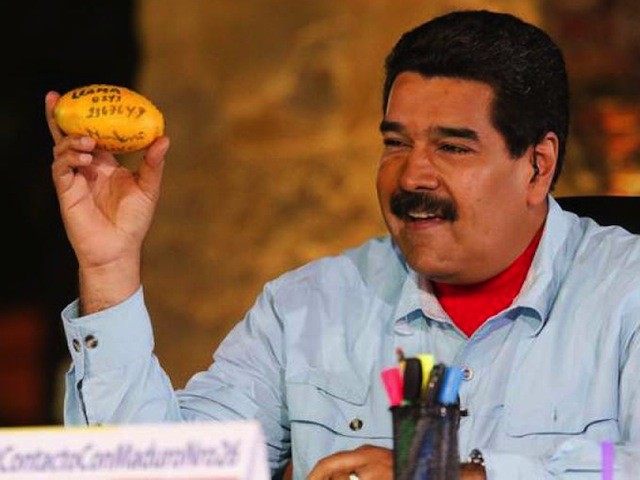President Nicolás Maduro of Venezuela has replaced his Minister of Urban Agriculture – a position created two weeks ago – as part of renewed efforts to convince Venezuelans to grow their own food, because import shortages are not going away anytime soon.
Lorena Freitez will replace Emma Ortega at the head of the urban farming agency, a sociologist who appears not to have any background in agricultural development. Maduro announced on his Twitter account that Ortega would continue “working from Aragua in the trenches of permanent struggle,” suggesting she was transferred, but not necessarily demoted.
Ortega, a close confidante of President Maduro’s with years of experience in farming, made her name, Fox News Latino notes, as a “colorful” anti-American demagogue, who urged violence against Americans following President Barack Obama’s declaration of Venezuela as a national security threat last year. “If a gringo comes here, we have to beat him with a stick. If we just have a pencil, we have to poke him in the eyes,” Ortega said in March.
Fox News Latino notes that the urban agriculture initiative is Maduro’s new way of telling Venezuelans in city centers that federal help is not on its way. Severe shortages of basic goods like flour, vegetable oil, and milk have been ongoing for years. Maduro attempted to resolve the problem with a ration system that made in more difficult for the average Venezuelan to shop in supermarkets and forced shoppers to wait in lines lasting as long as six hours to pay for their food.
“It’s time to develop a new culture of production,” Maduro suggested earlier this month. “Cilia and I have 50 egg-laying chickens, and all the yolks we eat, we produce.” He argued personal production was part of socialist society, suggesting that, in any urban apartment building, “anyone can have their productive orchard and you can produce lemon, tomato, pepper, have your egg-laying eggs.”
Urban agriculture is not a new idea in socialist Venezuela, as the Spanish newspaper El País notes. During his tenure, the late dictator Hugo Chávez proposed the idea in 2002 and in 2010, though in neither of those instances did his projects help Venezuela’s ailing economy.
Experts estimate that food shortages in Venezuela have reached between 50 and 80 percent, and the opposition lays the blame primarily on the socialist government. Rodrigo Agudo, a chemical engineer who works with the Agricultural agency of the opposition Democratic Unity Roundtable (MUD), notes that “if there are shortages today, the government is at the very least co-responsible:”
70 percent of coffee processing plants are in their hands, and there is no coffee; they own 50 percent of powdered milk processing plants, and there is no powdered milk; it owns 55 percent of corn flour processing plants, and there is none of that, either; owns 10-16 percent of sugar refineries in the country, and produces only 20 percent while 6 other plants produce the other 80 percent; it owns 70 percent of tuna and sardine packaging plants, and neither of those are available.
Even some Chavista officials have admitted that Maduro’s government is largely responsible for shortages. “We have to recognized that we have a structural failure in which 70 percent of the products we consume are imported… [the Maduro government] was not efficient in the distribution of foodstuffs,” José Luis García Carneiro, the socialist governor of Vargas state, said this week.
In addition to significant shortages of home goods, the Venezuelan Pharmaceutical Federation has warned that over 150 medications have reached “100 percent shortage” in the country, ranging from antibiotics to necessary cancer and AIDS medications. The Federation’s president, Freddy Ceballos, has called for the government to declare a “humanitarian emergency” and begin immediate efforts to import medication from abroad.

COMMENTS
Please let us know if you're having issues with commenting.